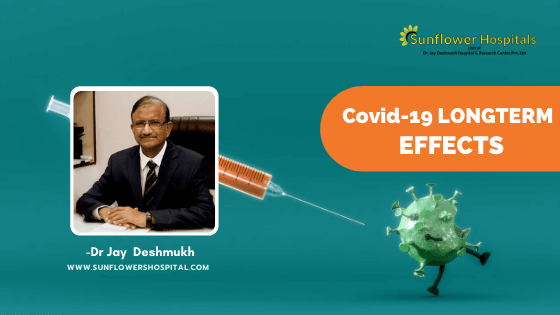Most patients of Covid-19 recover completely within a few weeks. Some even with a mild version of the disease may have symptoms after initial recovery. Covid-19 symptoms can sometimes persist for months. The virus can damage the lungs, heart and brain. This increases the risk of long term health problems.
Which group of individuals are likely to have long term symptoms?
Older people and people with many serious medical conditions are the most likely to have lingering Covid-19 symptoms. Even young, otherwise healthy people can feel unwell for many weeks or months after the infection.
What are the most common symptoms that can linger over time?
These symptoms generally include fatigue, shortness of breath, cough, joint pains, and chest pain. Other long term health issues may include muscle pain or headache, fast heartbeats or palpitations, loss of smell or taste. Some problems related to sleep, memory or concentration can occur. Rashes on skin or hair loss can occur.
What are the organs likely to be damaged after Covid- 19 infections?
Once the organs get damaged, long term symptoms are unmistakably common. Even those with mild symptoms in the initial phase can have long term heart problems even after initial recovery. These include weakness of the heart muscle leading to heart failure or irregular heartbeats.
What about the effects on the lungs?
Some patients continue to have cough or breathing disorders even after initial recovery. There are various explanations for the same. Scientists are yet to figure out how to prevent these complications. Scarring of the lungs or fibrosis can be a sequela of viral pneumonia. This can lead to long-term breathing problems.
What about the long term effects on the brain?
Memory loss, abnormal behavior can be seen in the elderly after a few weeks of illness. Even in young people, Covid-19 can cause strokes, seizures, and temporary paralysis. Known as Guillain- Barre syndrome Development and even Alzheimer’s diseases have been noticed.
What about blood clots and blood vessel problems?
Covid-19 can make blood cells more likely to clump up and form large clots. Large clots may cause heart attacks and paralysis. However, very small clots may block the tiny blood vessels of the heart known as capillaries. Other parts of the body that are damaged due to these clots include the lungs, liver, legs, and kidneys. Long-lasting problems in the kidneys and liver may be due to leakage of blood in these organs.
What about problems related to mood and fatigue?
People who have had severe symptoms have to be treated in intensive care settings in the hospital. With cardiac monitors, syringe pumps, ventilators, dialysis equipment and other life-saving equipment around them and few unfortunate patients dying around them are an experience they would never ever forget. Even surviving this experience can cause post-traumatic stress syndrome and can result in depression and anxiety.
How to prevent these long-term complications after Covid-19 infection?
Scientists are yet to find out why these health issues are more common in certain individuals. Early diagnosis and treatment as per the current guidelines may be helpful. High-risk individuals may include the elderly, diabetics and the obese. Those with underlying asthma, COPD and cardiovascular diseases need to be extra careful.
Many long term Covid-19 effects still unknown?
Scientists are closely observing individuals carefully for other effects on the human body. Most of the questions still remain unanswered on this important issue. It is important to remember that most patients recover completely after the initial phase. However, there are many long-term long-lasting problems from Covid-19 infections. The exact modes Operandi to predict and manage these health issues continue to be enigmatic. It is, therefore, more important to wear a mask, keep social distancing and keeping hands clean.


